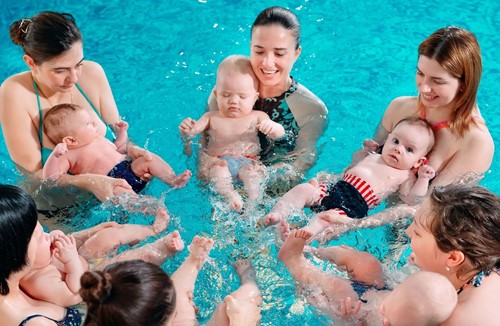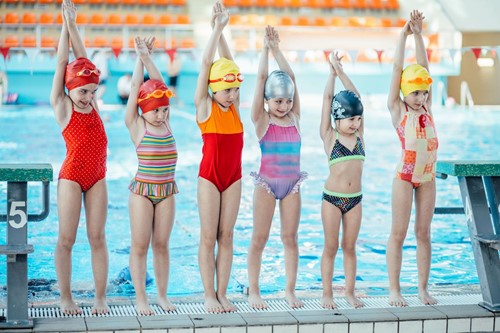The Surprising Benefits Of Baby Swimming Lessons
Engaging children in physical activities is vital for their overall growth and development. However, parents often grapple with selecting a suitable one. They want something enjoyable, safe, and beneficial for their child's well-being.

The choice becomes more challenging with an array of options available, each boasting unique benefits. It's a delicate balance between choosing an activity that nurtures their talents and interests while ensuring they reap the health and developmental rewards. So, it's more than a mere pastime; it's about shaping a healthy, confident, and skilled individual.
When considering activities for your young ones, baby swimming lessons might not be the first thing that comes to mind. However, these lessons offer many unexpected benefits, especially if undertaken in state-of-the-art institutions like Stateswim Australia or others. They not only help in developing critical life skills but also contribute to health and emotional well-being.
Here are five enticing benefits of baby swimming lessons that may cause you to reconsider your options:
1. Develops Essential Life Skills
Firstly, baby swimming lessons can significantly enhance your child's life skills. As they learn to navigate in the water, they're simultaneously mastering essential techniques such as coordination and balance.
More than that, they understand discipline and concentration, which are vital in their later years. Following precise swimming techniques requires consistent practice and focus. This, in turn, fosters discipline as they adhere to routines and sharpens concentration as they master each stroke, enhancing their overall cognitive abilities.
Secondly, these classes foster independence. Overcoming the challenge of the water instils confidence and self-assurance. This empowerment, starting at a young age, aids in creating resilient individuals who aren't easily daunted by life's challenges.
Lastly, exposure to structured classes from a tender age aids in developing listening skills and the ability to follow instructions. Such habits cultivated early on often pave the way for smoother academic learning.
2. Encourages Physical Fitness
Swimming is an excellent full-body workout that benefits the heart and lungs and promotes muscular development. It's especially beneficial in an era where sedentary activities like video games and screen time often dominate children's pastimes. This trend has led to a decline in physical activity among children, raising concerns over associated health issues like obesity and reduced muscular development, necessitating a push for more active pursuits.
Swimming aids in improving cardiovascular fitness. Regular swimming sessions enhance heart and lung function, which are crucial for overall health.
Also, swimming promotes muscle strength and flexibility. Water resistance helps tone muscles and build strength, providing a solid foundation for future physical fitness.
Furthermore, swimming lessons can help maintain a healthy weight. Being an enjoyable activity, children often spend more time swimming, thus promoting caloric burn and preventing childhood obesity.

3. Enhances Cognitive Abilities
Swimming does more than just improve physical health; it also boosts cognitive abilities. Navigating water requires concentration, spatial awareness, and an understanding of cause and effect.
Swimming fosters problem-solving skills. A child learning to move and adjust to changing water currents develops an understanding of cause and effect.
Additionally, it enhances spatial awareness. Navigating through water improves the perception of one's body in space, a crucial skill in daily activities.
Moreover, the rhythmic nature of swimming promotes bilateral brain development, potentially enhancing learning abilities in other areas.
4. Fosters Social Skills
With baby swimming lessons, there's also the benefit of social interaction. Children learn about cooperation and teamwork, building blocks for successful relationships, from the first swimming session to all subsequent ones.
Swim classes provide an opportunity for your child to meet peers. This interaction encourages communication skills and builds friendships. It also fosters teamwork. Many swimming activities involve coordination and cooperation, promoting mutual understanding.
Besides, swimming encourages empathy. Through shared experiences, children can learn to understand and respect the feelings of others.
Encouraging interaction during swimming for introverted children may seem daunting, but it is reasonably achievable with gentle strategies. Begin with group swimming lessons, fostering a sense of belonging and reducing the pressure of individual interactions. Encourage them to participate in collaborative swimming games, subtly promoting teamwork.
Utilise instructors or peers as positive role models, exhibiting interactive behaviour. Provide positive reinforcement for any social initiative they take. Over time, involve them in swim competitions, offering a common goal to rally around with their peers. Remember, patience and gradual exposure ensure the child feels comfortable and confident in their social interactions.
5. Provides Emotional Resilience
Finally, swimming can provide emotional benefits. The skills and experiences gained from swimming often contribute to emotional resilience.
Firstly, overcoming fears associated with water boosts self-confidence. This achievement often translates into courage when facing other fears and challenges.
Secondly, the calming effect of water can help manage stress. Regular swimming often leads to improved moods and increased relaxation.
Lastly, success in swimming can boost self-esteem. Each skill mastered is a confidence booster, contributing to a positive self-image.
Conclusion
Baby swim lessons offer more than just aquatic skills. They provide a well-rounded approach to early childhood development. Swimming is a holistic development activity that cultivates skills helpful in and out of the water, significantly enhancing your kid's early life experiences.
As you plan activities for your child, consider these benefits and consider including baby swimming lessons in their routine. After all, it's not just about making a splash; it's about making a difference in your child's life.